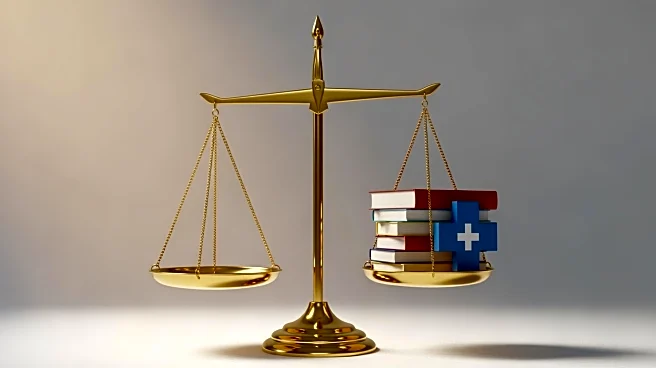What's Happening?
Morocco has announced a significant increase in its budget allocation for health and education, raising it to 140 billion dirhams ($15 billion) for the year 2026. This marks a 16% increase from the previous year, as stated by the royal palace. The decision
comes in response to recent protests by youth across the country demanding improvements in these sectors. The budget allocation is set to represent approximately 10% of Morocco's GDP. Additionally, Morocco's economy is projected to grow by 4.8% this year, an increase from 3.8% in 2024, driven by domestic demand and the performance of the non-farming sector. The draft budget also includes measures to reduce regional inequalities and will be presented to parliament for detailed discussion next week.
Why It's Important?
The increase in budget allocation for health and education is a critical step towards addressing the demands of Moroccan youth who have been actively protesting for better services. This move is expected to enhance the quality of life and educational opportunities for citizens, potentially leading to a more skilled workforce and improved public health outcomes. The economic growth forecast further indicates a positive outlook for Morocco's economy, which could attract more investments and foster economic stability. The focus on reducing regional inequalities and promoting participation of women and youth in elections reflects a broader commitment to social equity and democratic governance.
What's Next?
The Moroccan finance minister is set to present the detailed budget to parliament next week, where it will be discussed and potentially amended. The adoption of new laws to promote youth and women participation in elections and prevent corruption is expected to influence the political landscape, encouraging more inclusive and transparent governance. Stakeholders, including political leaders and civil society groups, will likely engage in discussions to ensure the effective implementation of these budgetary and legislative changes.
Beyond the Headlines
The budget increase and legislative changes could have long-term implications for Morocco's socio-economic development. By prioritizing health and education, Morocco is investing in its human capital, which is essential for sustainable development. The emphasis on reducing regional inequalities may also lead to more balanced economic growth across the country, potentially reducing urban-rural disparities. The focus on anti-corruption measures and promoting youth and women in politics could foster a more accountable and representative political system.















